Тест. тесты по английскому1. A. Edward Jenner
 Скачать 1.21 Mb. Скачать 1.21 Mb.
|
|
Модуль I. Medical scientists 1.1. Edward Jenner. I used to. 1. This man is originator the method of “vaccination”. Who is he? 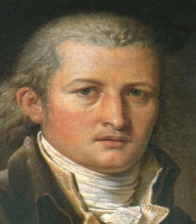 A. Edward Jenner D. Louis Pasteur B. Florence Nightingale E. I. I. Mechnikov C. Robert Koch 2. Дополните предложение: I … … go to the gym. I stopped going a few years ago. A. was D. is B. used to E. are C. did 3. Выберите перевод выделенного слова: It was vaccination against «smallpox». A. полиемилит D. столбняк B. оспа E. простуда C. тонзиллит 4. Закончите предложение: Edward Jenner was born … . A. at London, England, on May 17, 1749. D. at Petersburg, Russia, on May 17, 1749. B. at Leon, France, on May 17, 1749. E. at Berkeley, Gloucestershire, on May 17, 1749 C. at Rome, Italy, on May 17, 1749. 5. Отметьте перевод словосочетания: делать прививку. A. to inoculate D. to prevent B. to treat E. to devote C. togive 6. Дополните предложение, обращая внимание на картинку: Edward Jenner was an English physician who discovered the vaccination against … .  A. mumps D. plague B. typhoid E. smallpox C. chickenpox 7. Ответьте на вопрос: What and when did Edward Jenner discover? A. Edward Jenner discovered the “germ theory” in 1798. B. Edward Jenner discovered the method of “pasteurization” in 1798. C. Edward Jenner discovered the method of “vaccination” in 1798. D. Edward Jenner discovered the method of “treatment” in 1798. E. Edward Jenner discovered the method of “recovery” in 1798. 8. Ответьте на вопрос: What does the word “vaccines” mean? A. In Latin the word “vaccines” means “infection”. B. In Latin the word “vaccines” means “germ”. C. In Latin the word “vaccines” means “injection”. D. In Latin the word “vaccines” means “cell”. E. In Latin the word “vaccines” means “cow”. 9. Вставьте подходящий по смыслу глагол: I used to … tennis. A. read D. meet B. treat E. play C. take 10. Найдите правильный перевод предложения: I used to read a lot of books. A. Бывало я поздно ложялся спать. D. Бывало я покупал много книг. B. Бывало я читал много книг. E. Бывало я продавал книги. C. Бывало я ночью читал книги. 1. 2. I. I. Mechnikov. What are you doing tomorrow? 1. Ответьте на вопрос: When and where I. I. Mechnikov was born? 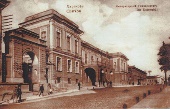 A. I. I. Mechnikov was born in 1845 in the village Ivanovka, not far from the city of Kharkov. B. I. I. Mechnikov was born in 1456 in the USA. C. I. I. Mechnikov was born in 1544. D. I. I. Mechnikov was born in 1389 in France. E. I. I. Mechnikov was born in 1845 in the village Ivanovka, not far from the city of Odessa. 2. Дополните предложение: Since his early childhood I. I. Mechnikov became interested in … . A. anatomy D. pharmacy B. biology E. botany C. natural sciences 3. This man was the first to observe the phenomenon of phagocytosis in experiments with lower animals. Who is he? 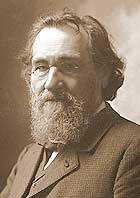 A. Edward Jenner D. I. I. Mechnikov B. Florence Nightingale E. Hippocrates C. Louis Paster 4. Ответьте на вопрос: What was I.I. Mechnikov awarded for in 1908? A. I. I. Mechnikov graduated from the University when he was only 19 years old. B. Since his early childhood I.I. Mechnikov became interested in natural sciences. C. I. I. Mechnikov was awarded by the Nobel Prize for his investigations on phagocytosis. D. I. I. Mechnikov observed the phenomenon of phagocytosis in experiments with lower animals. E. I. I. Mechnikov was awarded by the Nobel Prize for his investigations on pharmacy. 5. Выберите глагол: I. I.Mechnikov received the Nobel Prize for his investigation on phagocytosis. A. received D. investigation B. I. I. Mechnikov E. phagocytosis C. NobelPrize 6. Заполните пропуск, выбрав подходящее по смыслу слово: I. I. Mechnikov performed considerable work on the effect on bacteria and devoted many years of his life to the problem of … . A. life D. effect B. aging E. investigation C. lactic acid 7. Укажите перевод словосочетания: белые кровяные клетки. A. plasma D. blood groups B. white blood cells E.white blood groups C. red blood cells 8. Дополните предложение: I. I. Mechnikov died … . A. in 1891 at the age of 52. D. in 1916 at the age of 71. B. in 1945 at the age of 65. E.in 1945 at the age of 61. C. in 1906 at the age of 63. 9. Выберите правильный перевод «Future Simple Tense»: A. Прошедшее время D. Будущее простое время B. Настоящее простое время E. Будущее длительное время C. Настоящее длительное время 10. Укажите наречие будущего времени: A. tomorrow D. now B. today E. at the moment C. yesterday 1. 3. Louis Pasteur. I’m going to. 1. Ответьте на вопрос: Who is this man and when he was born? 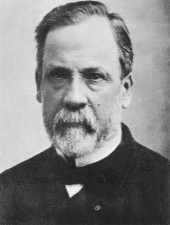 A. Louis Pasteur was born in 1822. B. Louis Pasteur died in 1822. C. Louis Pasteur graduated the University in 1822. D. Louis Pasteur was born in 1888. E. Louis Pasteur was born in 1898. 2. Дополните предложение: Louis Pasteur was a prominent French chemist … . A. one of the founders of modern biology. D.one of the founders of modern pharmacy. B.one of the founders of modern chemistry. E. one of the founders of modern virology. C. one of the founders of modern microbiology. 3. Закончите предложение: In his early Pasteur devoted his energy to the … . A. discovery of X-rays B. discovery of microorganisms in wine and beer production C. discovery of bacteria and cells D. discovery of microbiology E. discovery of virology 4. Отметьте перевод выделенного слова: Louis Pasteur introduced the idea of heat«sterilization» for these products and milk. A. бактериология D. вирусология B. стерилизация E. пастеризация C. микробиология 5. Ответьте на вопрос: What did Pasteur develop on the basis of his observations? 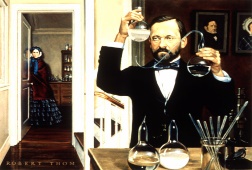 A. on the basis of his observations he developed a vaccine for hydrophobia B. Louis Pasteur introduced the idea of heat sterilization for these products and milk C. discovery of microorganisms in wine and beer production D. the founder of modern microbiology E. on the basis of his observations he developed a vaccine for hepatitis 6. Выделите перевод словосочетания: основатель микробиологии. A. the founder of virology D. the founder of microbiology B. the founder of anatomy E. the founder of biology C. the founder of surgery 7. Ответьте на вопрос: Who did develop a vaccine for hydrophobia? A. Edward Jenner D. Robert Koch B. Louis Pasteur E. Professor Lesgaft C. I. I. Mechnikov 8. Укажите глагол: L. Pasteur discovered the method to prevent some infection diseases. A. method to prevent D. L. Pasteur B. discovered E. some C. infectious diseases 9. Выберите перевод: to be going to. A. быть D. идущий B. собираться что-либо делать E. что-либо делать C. идти 10. Укажите форму будущего времени: A. have/ has D. do/ does B. am/ is/ are E. to be going to C. did 1. 4. Robert Koch. Will, shall (1). 1. Закончите предложение: Robert Koch was the founder of … . A. modern microbiology D. phagocytes B. germ theory E. virology C. X-rays 2. Ответьте на вопрос: Who is this man and what is he? 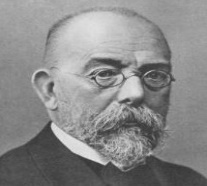 A. Louis Pasteur was a prominent French bacteriologist. B. Edward Jenner was a prominent Russian physician. C. Robert Koch was a prominent German bacteriologist. D. Edward Jenner was a prominent German scientist. E. Hippocrates – the Father of medicine. 3. Закончите предложение: Robert Koch was born in … . A. 1823, died in 1898. D. 1843, died in 1910. B. 1845, died in 1874. E. 1833, died in 1900. C. 1815, died in 1844. 4. Вставьте нужное слово: In 1882 Koch discovered … . A. bacillus D. living organism B. bacterium E. virus C. tuberculosis bacilli 5. Дополните предложение: Robert Koch carried on many experiments on …in a small laboratory. 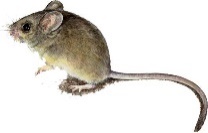 A. rabbit D. dog A. rabbit D. dogB. mice E. rat C. cat 6. Ответьте на вопрос: What was Robert Koch awarded for? A. In 1884 Koch published his book on cholera. B. Koch isolated a small comma-shaped bacterium. C. Robert Koch determined that these bacteria spread through drinking water. D. In 1905 Koch got a nobel Prize for his important scientific discoveries. E. Koch got a nobel Prize for his discovery of pasteurization process. 7. Выделите вспомогательные глаголы Future Simple Tense: A. am/ is/ are D. have/ has B. do/ does E. did C. will/ shall 8. Найдите предложение в Future Simple Tense: A. I am at the college now. D. I will be at the college at 8.30 o’clock. B. I was at the college yesterday. E. I went to the college yesterday. C. I wasn’t at the college yesterday. 9. Отметьте отрицательное предложение в Future Simple Tense: A. Diana is passing the exam. D. Will Diana pass the exam. B. Diana won’t pass the exam. E. Diana didn’t pass the exam. C. Diana will pass the exam. 10. Выделите вопросительное предложение в Future Simple Tense: A. Will you go the college tomorrow? D. I don’t go to the college? B. I will go to the college? E. Do you go to the college? C. I won’t go to the college? 1. 5. D. I. Ivanovsky - the Founder of virology. Will, shall (2). 1. Ответьте на вопрос: When was Dmitry Iosophovitch Ivanovsky born? 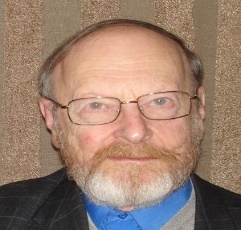 A. Dmitry Iosophovitch Ivanovsky was born in 1769. B. Dmitry Iosophovitch Ivanovsky was born in 1765. C. Dmitry Iosophovitch Ivanovsky was born in 1765. D. Dmitry Iosophovitch Ivanovsky was born in 1864. E. Dmitry Iosophovitch Ivanovsky was born in 1764. 2. Дополните предложение: D. I. Ivanovsky investigated… . A. the tobacco mosaic disease D. microbioilogy B. the structure of plants E. comma shaped bacteria C. medicinal plants 3. Ответьте на вопрос: Who was D. I. Ivanovsky? A. D. I. Ivanovsky was the founder of nursing profession. B. D. I. Ivanovsky was the founder of virology. C. D. I. Ivanovsky was the founder of bacillus. D. D. I. Ivanovsky was the founder of microbiology. E. D. I. Ivanovsky was the founder of biology. 4. Укажите перевод предложения: Вирусология - отрасль микробиологии. 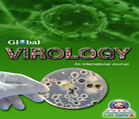 A. Microbiology and physiology of plants. D. Virology is microbiology. B. Virology is the branch of microbiology. E. Virology is the branch of chemistry. C. He was the founder of virology. 5. Дополните предложение: D. I. Ivanovsky came to conclusion that … . A. bacteria were the smallest living organisms B. made many experiments on various plants C. these living organisms were called viruses D. the living organism smaller than bacteria existed in the environment E. bacteria were the biggest living organisms 6. Ответьте на вопрос: How are the smallest living organisms called? A. living organisms D. virus B. small organisms E. cell C. bacteria 7. Отметьте правильно составленное предложение: A. Shall go students to the practice in November. D. November students shall go to the practice in. B. Go to the practice students shall in November. E. Students to the practice in November shall go. C. Students shall go to the practice in November. 8. Отметьте правильно составленное предложение: A. Сollege I will be at the at 8.30 o’clock. B. О’clock I will be at the college at 8.30. C. Вe at the I will college at 8.30 o’clock. D. I at the college at 8.30 o’clock will be. E. I will be at the college at 8.30 o’clock. 9. Найдите правильный перевод предложения: Нe will work at the chemist’s shop. A. Он будет работать в больнице. D. Он будет работать в аптеке. B. Он будет работать в магазине. E. Он будет работать в колледже. C. Он не будет работать в аптеке. 10. Найдите соответствующее продолжение к предложению: These tablets are too expensive. A. I don’t think I’ll buy their. D. I don’t think I’ll play. B. I don’t think I’ll go there. E. I don’t think I’ll eat it. C. I don’t think I’ll do it. 1. 6. Professor Lesgaft. Might 1. Дополните предложение: Professor Lesgaft was a prominent … . A. Russian scientists who discovered the blood groups B. Russian anatomist and a talented teacher C. Russian biologist and a talented teacher D. French bacteriologist E. Founder of microbiology 2. Дополните предложение: This man is a prominent researcher who worked out the science of physical culture. Who is he?  A. Edward Jenner D. I. I.Mechnikov B. Professor Lesgаft E. Robert Koch C. D. I. Ivanovsky 3. Дополните предложение: In his work Professor Lesgaft divided the muscles into ... . A. two basic groups – static and dynamic D. two basic groups B. two basic groups - long and short E. two basic groups-static and long C. three basic groups 4. Дополните предложение: Lesgaft determined that the static muscles were formed by … . A. long bands of muscular fibers D. the dynamic muscles were formed by B. short bands of muscular fibers E. different bands C. thin bands of muscular fibers 5. Что изображено на этой картинке? 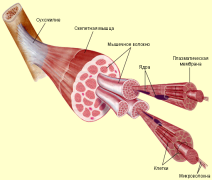 A. hand D. bone |
